- Home
- Jay Bonansinga
The Sleep Police Page 7
The Sleep Police Read online
Page 7
It was like looking into a fun house mirror.
The on-screen Frank’s eyes were glinting.
“It’s pretty amazing, how it works. It’s like I live in a cocoon, and I turn into a butterfly every few nights when Frank finally drifts off to sleep. And Frank’s not even aware of it. At least, I don’t think he is. He might suspect something’s going on, I don’t know. But he’s been blacking out so much lately, it’s pretty easy.”
Frank made a sound—hardly audible above the sizzle of the TV’s speaker—a little, anguished, breathy sound.
He stared at the TV.
“I’ve lived inside Frank for most of his life, but I only started coming out about ten years ago. I know it’s a big bite to swallow, Deets. I realize you’re an old pragmatist, but try to understand: I kill because I have to. I don’t have a choice. Most guys, they have a choice. They’re evil. But I’m not like that. I’m doing God’s work. The work has to be done.”
Another pause.
Frank let out a tense sigh and looked away. “Somebody’s fucking with me,” he whispered to himself, and then shook his head and tried to laugh. But no laughter would come out of him. No laughter would come.
His image kept flickering on the screen.
“Admit it, Deets: These past few days, you were starting to look at Frank a little more closely. Each successive case within a five-mile radius of Frank’s apartment at the time of the killing? Remember that little ratty brownstone Frank lived in down on Grand? That was six blocks from where you found the first victim. And then there’s the cigarette butt—Frank’s brand—and the ligature marks around the victims’ necks. I think if you check, you’ll find that Frank is left-handed.”
Frank was gaping at the screen now, his eyes burning, the icy dread seeping into his gut.
This was real. This was no joke. This was no fake. This was him.
Or at least, some facsimile of him.
“Anyway, that’s about all I wanted to say, Deets. I’m tired of this life. I’ve done my part for God, and now it’s time to retire. I realize after this tape gets around, they’ll put us away for a long, long time, and that’s probably the best thing.”
Another pause.
Somewhere in the hidden, shadowy recesses of Frank’s mind, a warning alarm was sounding. The ME reports had described lacerations across the necks of each victim. Frank had agonized over those forensic photos, the macro close-ups of strangely similar papery cuts on the left side of each victim’s neck. Now he was standing in the dusty property room, staring down at his left hand, staring at his nicotine-stained thumb, staring at his thumbnail. He wore his nails long, but he bit them compulsively. His thumbnails were always jagged.
Without even being aware of it, Frank was edging slowly away from the TV now, backing toward a small metal typing desk in the far corner of the room, toward the lower left-hand drawer where Trout kept a secret stash of Johnny Walker in a pint bottle, swaddled in newspaper and rubber bands. But Frank couldn’t take his eyes off that dusty TV screen. His video image had a shimmer of something like madness in its eyes. Or maybe it was simple exhaustion, or perhaps even disgust. It was hard to tell. The picture was very contrasty and softly focused, the trademarks of a cheap, consumer-grade video camera.
“Oh, I almost forgot. You might be wondering who I am, whether or not I have a name...”
Frank was reaching down without looking, opening the bottom desk drawer, rooting around for the bottle. He lifted it out of the drawer and set it on the desk. He unscrewed the plastic cap and took a swig, his gaze riveted to the TV screen.
“...I call myself The Sleep Police.”
All at once the image turned to snow, the recording coming to an abrupt end.
Frank chugged the remaining contents of the Johnny Walker bottle.
The only sound in the room now was the hissing of blank tape across playback heads.
And the feverish voice echoing in Frank’s mind, about to change his life forever.
PART II
FRANK’S FINAL ACT AS A POLICEMAN
“What other dungeon is so dark as one’s own heart! What jailer so inexorable as one’s own self!”
— Nathaniel Hawthorne
The House of Seven Gables
CHAPTER ELEVEN
Frank hurried through the turnstile, his stomach stitched with panic. He grabbed a basket and headed for the rear of the drug store.
The twenty-four-hour Walgreens was jumping with early morning traffic, the aisles blazing with fluorescent light. There was an old blue-haired woman at the photo counter, thumbing through coupons, a couple of suits standing behind her in the checkout line, cradling plastic-wrapped muffins and self-serve coffee. There was a teenage stockboy over by the cosmetics counter, stamping price tags on boxes of Clairol rinse treatments. The rear of the store was a labyrinth of medications and personal hygiene products.
Frank rushed along the back wall, past the antacids, past the laxatives, past the cough drops and cold tablets, until he found the sleep-aid display. He scanned the bottom shelf. Beneath the boxes of Nytol and Sominex were the stimulants. Frank started tossing boxes into his basket: Caffedrine caplets, Ultra Pep-back with Eleveine, No-Doz, Maximum Strength Awake, and Stay-UP by Miles. Just to be safe, he went over to the cold relief shelf and grabbed some Sudafed. Then he went over to the diet bin and picked up some Dexatrim and Acutrim. Anything that would keep him awake.
Anything to keep him from cracking apart again.
On his way back to the checkout counter, he grabbed a couple of bottles of Vitamin B-12 and a six-pack of Jolt Cola. He had plenty of coffee at home, and if the need arose, he would stop at a Starbucks on the way. He was not going to black out again. He was not going to fall asleep until he figured things out. In front of him, the line at the cash register had grown. There were a couple of black matrons in tank tops and summer hats standing behind the suits.
Frank fidgeted, waiting for his turn, his mind churning like an engine with broken bearings. He felt damaged. He felt filthy, like a leper. He felt as though his face were deformed, as though the people around him were trying not to stare. Could he have another personality inside him—a parasite feeding off the damaged cells of his brain—and not even be aware of it? But the worst part—the part that he wouldn’t let himself think about right now—was the pathology.
The thumb suckers.
“Must be pretty damn tired,” a voice said, shaking Frank out of his rumination.
Frank looked up at the checkout girl. “What?—oh—yeah.”
“All this stuff, must be awful damn tired,” the girl commented as she scanned each box. A heavyset black girl in a purple Walgreens pinafore, she seemed only mildly interested.
“You have no idea,” Frank said, pulling his credit card from his wallet. His gaze fell on his driver’s license, then his detective shield and his county ID badge—the tiny thumbnail mug shots of a young Greek cop staring earnestly into the camera, the same face that had just glared out at him from that statement videotape. All at once his whole identity seemed corrupted, fractured.
Who was he?
“Total’s $57.16,” the clerk mumbled.
Frank swiped his card on the self-service reader, signed the receipt, grabbed his bag of stimulants and left in a hurry.
The voice was crackling over the line: “And you’re sure there’s no way you made this thing and forgot about it.”
“Absolutely positive.”
“Maybe some kind of profiling technique? Getting into the killer’s mindset?”
“No way.”
“Some kind of process you dreamt up?”
“Believe me, Doc, I would remember.”
“Fair enough. I’ve just got to ask the obvious questions.”
“I understand,” Frank said, wiping the sweat from his brow with a trembly hand. He was standing in a phone booth at the corner of Western and Peterson, and the Plexiglas-encased coffin was like a pressure cooker. The morning sun was beating
down on the booth, and Frank could smell his own body odor like a peppery spoor. “I just keep thinking, it looks like me, it sounds like me, but it isn’t me.”
“Do you think it’s something you might have made during noctambulation?” asked the voice.
Frank thought about it. “You mean sleepwalking?”
“Exactly.”
Frank shrugged. “I guess. But Jesus, I mean, the video is so blatantly—it’s so—what’s the word?—it’s so insinuating.”
“I understand,” the doctor said. “But this kind of condition is complex and fluid.”
“Jesus,” Frank uttered under his breath. He was thinking of his mother. He was thinking of that over-boiled look in her eyes the day she killed the teacher, and the way Frank’s own eyes looked on that obscene videotape.
“Okay, Frank, I want you to do something for me,” the voice said.
“Sure, okay,” Frank said.
“I want you to try and stay calm, and we’ll work through this thing together,” the doctor said.
Frank took a deep breath. Even the simple presence of Henry Pope’s voice in his ear made him feel better. Frank had called the doctor at home—amazingly, Pope’s number had been in the book—and luckily the doctor had not left for work yet. Frank had expected Pope to be upset about having to deal with a frantic patient at this early hour, but the psychiatrist had been monumentally courteous and accommodating. It was as though Henry Pope were a life preserver tossed out over the phone lines to a drowning Frank. At least now Frank would be able to keep his head above water and think.
“I hear you, Doc, I’m trying…I’m trying to stay calm,” Frank said.
“Call me Henry.”
“Okay, fair enough,” Frank said. “Henry it is.”
“I want to ask you something else, Frank,” the voice said.
Frank took a deep breath. “Go ahead.”
“This isn’t going to be easy to answer.”
“Fire away.”
“Is it possible—what I mean is—is there any possibility that the tape is authentic?”
A cold current jolted through Frank’s gut. “What do you mean, authentic?”
“What I mean is, do you think there’s any possibility—and I’m not saying there is—but do you think there’s any possibility that this other personality actually exists?”
“What?—no—I mean—Jesus—no.”
“Do you understand what I’m asking?”
Frank swallowed air. The tape was resting inside his jacket pocket, a black plastic tumor radiating dread. “Yeah—I mean—yes, I understand what you’re asking, and no, no way, there’s no way.”
“I gotta ask the question, Frank.”
“I understand what you’re saying, but, I mean, how would it be possible for a man to have—you know what I’m saying—how would it be possible?”
“It’s pretty darn near impossible, Frank, to be honest with you.”
Frank let out a pained sigh. “At least I got that going for me.”
“The only reason I’m even getting into this right now, Frank, is because, you know, there are deaths involved.”
“You’re talking about the thumb suckers.”
“The cold cases, yes.”
Frank was nodding. “And this tape, this videotape, it amounts to a confession, basically.”
There was the briefest of pauses. “I’m not saying that, Frank.”
A car horn trumpeted in the distance, making Frank jump slightly. The caffeine pills were already starting to work on him. He mopped the sweat from his brow and took another deep breath.
A few minutes ago, at the beginning of the conversation, Frank had reminded Henry Pope of the doctor-patient confidentiality oath. It was specified in both the union bylaws and the group policy’s small print that a psychiatrist cannot reveal anything spoken in confidence under the aegis of a patient’s therapy. But when the commission of a crime is involved, the lines of discretion get a little blurry.
“All I’m saying is, you’ve got to look at all sides of this thing, Frank,” Henry Pope was saying on the other end of the line. “Let’s just say for a minute this other personality is authentic. Hypothetically.”
Frank wiped his mouth. “Tell me again what you mean by authentic.”
“Okay, look, lemme ask you this: Is it you on camera? Are you absolutely certain it’s you, and it’s not a fake?”
An inexplicable chill travelled through Frank as he remembered staring into his own eyes. “I don’t know—yeah. I guess I’m pretty sure it’s not a fake.”
“Okay, then, if it’s not a fake, and it’s really you, then that narrows down the explanations. Would you agree?”
“Yeah. I guess. Yeah.”
“Then the real question is, what if it’s more than some kind of ambulatory trance state?”
“Ambulatory what?”
“Another form of sleepwalking, sort of like you’re acting out some nasty anxiety dream. Does that make sense?”
Frank stared at his distorted reflection in the chrome faceplate of the pay phone. “I guess, yeah.”
“Then you’ve gotta look at the other possibilities as well.”
“Right.”
“And whether the guy on the tape is real.”
“The other personality.”
“That’s right.”
Frank shivered again. He felt as though he were running a temperature. “Go on,” he uttered.
“All I’m saying is, there’s a way to deal with this kind of thing.”
“You mean when there’s a crime involved,” Frank said.
“That’s exactly right, there’s a way to deal with this when there’s a homicide involved.”
“You think it’s possible I’ve got another personality?”
There was another brief pause. “That’s impossible to answer, Frank.”
“But you’ve got an idea how to deal with this?”
“Look, I’m not saying I think you’re at this point yet,” the voice said.
“What point?”
“I’m not saying I think you should do this.”
“Do what?”
“I guess you’d call it—what?—voluntary commitment?”
Frank closed his eyes for a moment. “I’m not ready for that yet.”
“I understand—”
“I just don’t think I’m ready for that yet.”
“I understand, Frank, and believe me, I wasn’t implying—”
“I’ve gotta go.”
“Frank—”
“I really have to get going. I’ll call you back. I’ve gotta figure this thing out.”
“Frank, wait—”
“I’ll call you back, I’m sorry,” Frank said, then hung up the receiver.
He shoved the booth door open, and stumbled out into the Chicago morning.
CHAPTER TWELVE
The sun slanted down hard through the mini blinds across Frank’s front window. The heat was horrible. A single rotary fan clattered and swayed back and forth across the bay window, a woefully inadequate addition to the single window unit in the rear.
Frank’s living room was a stifling, airless tableau, the faded floral-papered walls sweating old odors of stale cigarettes and boiled cabbage in the heat. There were little numbered evidence flags everywhere—in the sofa cushions, in the Oriental rug, in the back of the TV, under the window overlooking the fire escape.
As an investigator, Frank’s job was all about observation. And now he was observing himself, his own environment. Buzzing with caffeine-induced adrenaline, eyes burning with emotion, he was struggling to look at his world, to find some trace, some clue of another personality. He was still hanging onto the slim hope that the videotape was a fake, or a fluke, or some kind of elaborate scam. But if it wasn’t—and Frank was truly cracked—then Frank wanted to be the one to find out first. And that was why he had called in sick today, and that was why he was treating his apartment like a crime scene.
Click!
He snapped off another Polaroid of the window by the fire escape. Then he peeled open the snapshot, and went over to his makeshift bulletin board leaning against the wall by his TV. He thumbtacked the photograph next to a bunch of others lined up in sequence.
Under the Polaroids were index cards scrawled with entries taken directly from Frank’s diaries. Over the past few years, whenever his blackouts had flared up, Frank had recorded them in his journals. He figured that the documentation might help with future medical treatment or therapy. But now they were forming a mosaic of clues.
Frank stared at the photograph of the window, as the Polaroid developed, going from milky to darker, richer colors. It was easier for him to be objective when looking at photographs. It was how he had been trained. It was the way of the crime lab. When Frank looked at the real objects, he sometimes missed things. But now he was staring at a shot of his own kitchen window, the congealed paint around the sill, the crank lock in the lower right hand corner.
Something clicked in his brain.
In the picture, through the dusty vinyl blinds, Frank could see the fire escape ladder leading down to the back alley, and the battered metal garbage dumpster down in the shadows. Frank glanced over at the index card next to the photo. Fever-chills spidered up his back.
He went over to the window and opened the crank lock, then swung open the hinged pane. He looked down at the weathered iron steps leading down to the cracked pavement, the mounds of soggy newspapers and trash.
“Wait a minute,” Frank murmured under his breath.
He strode back to the bulletin board and looked at the picture, and then read the journal entry underneath it, scrawled in his cramped handwriting. It was a recent entry, from only last week.
Can’t sleep again tonight! Dizzy as hell, heroes friend…What’s wrong with me? What’s wrong with me?

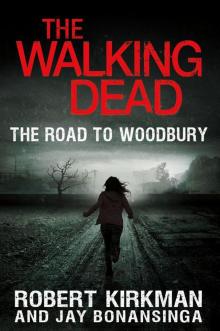 The Walking Dead: The Road to Woodbury
The Walking Dead: The Road to Woodbury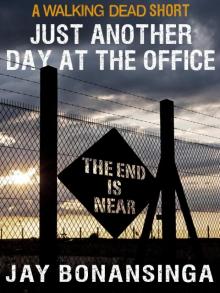 Just Another Day at the Office
Just Another Day at the Office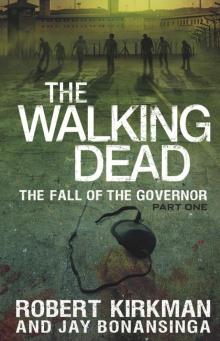 The Fall of the Governor: Part One
The Fall of the Governor: Part One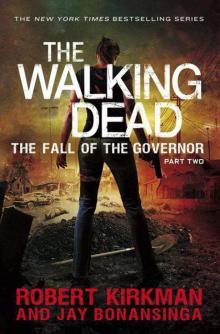 The Walking Dead: The Fall of the Governor: Part Two
The Walking Dead: The Fall of the Governor: Part Two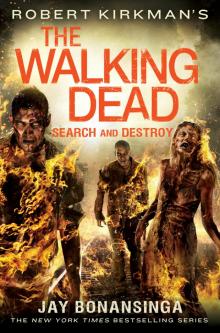 Search and Destroy
Search and Destroy Invasion
Invasion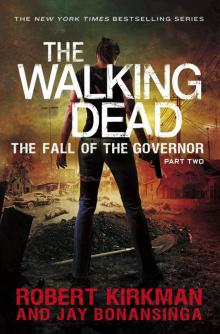 The Fall of the Governor: Part Two
The Fall of the Governor: Part Two The Walking Dead Collection
The Walking Dead Collection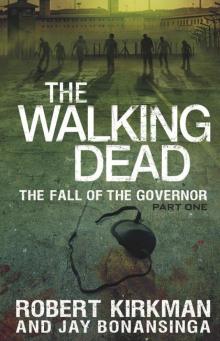 The Walking Dead
The Walking Dead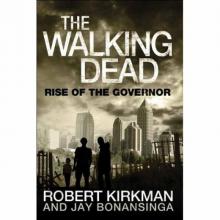 Descent
Descent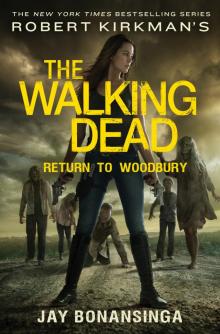 The Walking Dead: Return to Woodbury
The Walking Dead: Return to Woodbury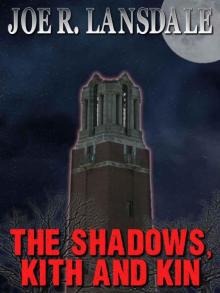 The Killer's Game
The Killer's Game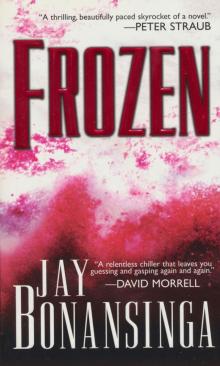 Frozen
Frozen Shattered
Shattered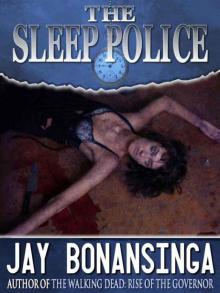 The Sleep Police
The Sleep Police Perfect Victim
Perfect Victim